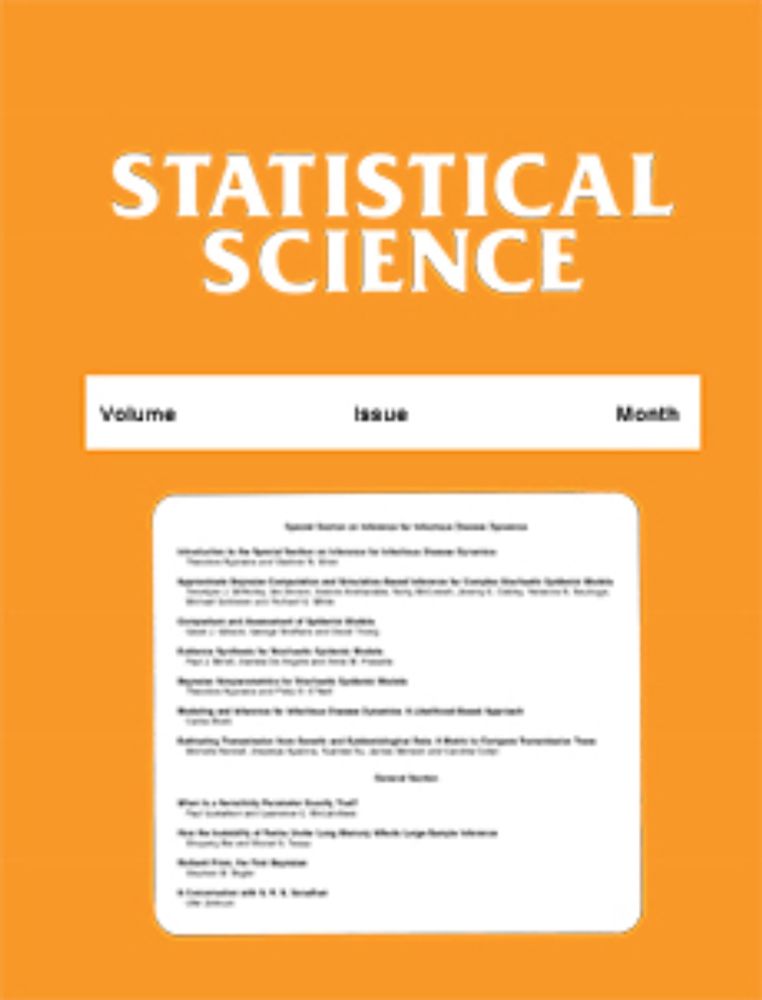Dan Malinsky
@danielmalinsky.bsky.social
Assistant Professor of Biostatistics at Columbia.
I study causal inference, graphical models, machine learning, algorithmic (un)fairness, social + environmental determinants of health, etc. Opinions my own.
http://www.dmalinsky.com
I study causal inference, graphical models, machine learning, algorithmic (un)fairness, social + environmental determinants of health, etc. Opinions my own.
http://www.dmalinsky.com
Real “is there a doctor on this plane??” moment
September 4, 2025 at 1:06 PM
Real “is there a doctor on this plane??” moment
Ooof can't believe I didn't catch that error on edit, my bad!
September 3, 2025 at 9:12 PM
Ooof can't believe I didn't catch that error on edit, my bad!
If a Leverhulme prize-winning philosopher calls it "philosophy" on the social constructionist account of "what is philosophy"...
September 3, 2025 at 6:21 PM
If a Leverhulme prize-winning philosopher calls it "philosophy" on the social constructionist account of "what is philosophy"...
Authors briefly mention tetrad constraints but then move on to discuss goodness-of-fit tests (not reliable for this) and a more informal "plausibility" considerations rather than formal model search procedures with consistency guarantees
August 6, 2025 at 2:40 PM
Authors briefly mention tetrad constraints but then move on to discuss goodness-of-fit tests (not reliable for this) and a more informal "plausibility" considerations rather than formal model search procedures with consistency guarantees
Curious how you think this connects to the large literature on discovering latent causal models from data (eg www.jmlr.org/papers/volum...) or at least testing the causal status of a hypothesized model rss.onlinelibrary.wiley.com/doi/full/10....
August 6, 2025 at 2:40 PM
Curious how you think this connects to the large literature on discovering latent causal models from data (eg www.jmlr.org/papers/volum...) or at least testing the causal status of a hypothesized model rss.onlinelibrary.wiley.com/doi/full/10....
In addition to the below I think this may be helpful: academic.oup.com/ectj/article...
August 5, 2025 at 1:33 PM
In addition to the below I think this may be helpful: academic.oup.com/ectj/article...
Do you know any papers that make the case for this well? Bc I think it is an ill-advised idea in general
July 31, 2025 at 4:48 PM
Do you know any papers that make the case for this well? Bc I think it is an ill-advised idea in general
Mohan and Pearl (and Tian) give results for various special cases of m-DAG models, but this work outlines (part of) a general identification theory more broadly applicable. Also I would say there are some philosophical differences
July 31, 2025 at 4:12 PM
Mohan and Pearl (and Tian) give results for various special cases of m-DAG models, but this work outlines (part of) a general identification theory more broadly applicable. Also I would say there are some philosophical differences
Agree! I think the view is expressed nicely here: arxiv.org/abs/2210.05558

Causal and Counterfactual Views of Missing Data Models
It is often said that the fundamental problem of causal inference is a missing data problem -- the comparison of responses to two hypothetical treatment assignments is made difficult because for every...
arxiv.org
July 31, 2025 at 3:21 PM
Agree! I think the view is expressed nicely here: arxiv.org/abs/2210.05558
This article by Didelez et al talks about (non)-collapsibility of OR and outcome dependent sampling in an illuminating way, imo: projecteuclid.org/journals/sta...

Graphical Models for Inference Under Outcome-Dependent Sampling
We consider situations where data have been collected such that the sampling depends on the outcome of interest and possibly further covariates, as for instance in case-control studies. Graphical models represent assumptions about the conditional independencies among the variables. By including a node for the sampling indicator, assumptions about sampling processes can be made explicit. We demonstrate how to read off such graphs whether consistent estimation of the association between exposure and outcome is possible. Moreover, we give sufficient graphical conditions for testing and estimating the causal effect of exposure on outcome. The practical use is illustrated with a number of examples.
projecteuclid.org
May 27, 2025 at 3:45 AM
This article by Didelez et al talks about (non)-collapsibility of OR and outcome dependent sampling in an illuminating way, imo: projecteuclid.org/journals/sta...
Good thing you were convinced by your judicious advisor to make this paper about fraud in “science” and not fraud in metaphysics so as not to enrage the wrong epistemic community 👀
May 17, 2025 at 3:39 PM
Good thing you were convinced by your judicious advisor to make this paper about fraud in “science” and not fraud in metaphysics so as not to enrage the wrong epistemic community 👀

